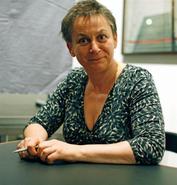 Anne Enright found literary acclaim on this side of the Atlantic with the release of her novel The Gathering, which won the 2007 Man Booker Prize. In that book, Enright explored the legacy of what might now be termed "Old Ireland": a place where, sadly, family loyalty and obedience to the Roman Catholic Church sometimes trumped the needs and safety of children.
Anne Enright found literary acclaim on this side of the Atlantic with the release of her novel The Gathering, which won the 2007 Man Booker Prize. In that book, Enright explored the legacy of what might now be termed "Old Ireland": a place where, sadly, family loyalty and obedience to the Roman Catholic Church sometimes trumped the needs and safety of children.
In her new book, The Forgotten Waltz (October 3, 2011, W.W. Norton), Enright has left "Old Ireland" behind: this Dublin romance takes flight during the "Irish Tiger" 1990s, when the country's economic boom was fueling changes in social mores. However, more than that, Enright said, her protagonist Gina, who leaves a stable marriage after a whirlwind affair, "believes she just couldn't help it. She didn't do it on purpose!"
Enright explained that she wanted to set the idea of a lack of consequence in personal behavior against the same in the financial atmosphere. "Another thing you have to understand in America is that this is a matter of degree," she noted. "While Gina may be thinking that times are terribly good, what she describes when she talks about her place is really a very ordinary home. In Ireland, people's quality of life was not very good for a long time."
 The era of ease and possibility that reigned for some years led, Enright thinks, to "faulty self-absolution on the part of people like Gina and Sean, her lover. It's not that I think there are hordes of saints in Ireland. I don't meet noble people, or write about them."
The era of ease and possibility that reigned for some years led, Enright thinks, to "faulty self-absolution on the part of people like Gina and Sean, her lover. It's not that I think there are hordes of saints in Ireland. I don't meet noble people, or write about them."
Gina and Sean are certainly less than noble. After meeting at Gina's sister's house, they begin an adulterous relationship that seems as neatly checklisted as a contractor's to-do list: drunken one-night stand to starry-eyed hotel trysts to tear-sodden afternoons. The comparison to a contracting checklist is not accidental, since the only thing Gina and Sean's friends, family and colleagues seem to care about more than drinking and sex is home remodeling. Tearing out the old and plastering it over with the new, Enright seems to be saying, is a not unsensible approach when the old ways have sustained so much damage.
However, there's structural damage, and there's plain cosmetic fixes. Enright knows that Gina's is "a very girlish approach to love. My title is about the dance of sexual love and its essential ungraspability--it does go away sometimes in long relationships, it does return, it does change tempo. Gina doesn't understand that, or maybe she doesn't want to. Is she a bunny boiler? For sure! She could have become one."
Gina doesn't go down the bunny-boiling road because two things happen. First, her mother dies, leaving her in an empty sort of grief. Second, Sean has a daughter named Evie who is somehow "not right"--and who (no spoilers here) winds up living with Gina and Sean, much to the former's consternation.
"Well, it's the scale of it, isn't it," Enright said. "With children, it's never as simple as making over a bedroom or changing out a carpet. The scale of it terrifies both Gina and Sean. Will it be there, Evie's 'problem,' for the rest of their lives? My answer is yes." She continued: "Motherhood is quite a spiritual state, and yet also an incredibly visceral one. And while Sean's not truly cognizant of what his daughter needs, Gina's great mistake is not realizing how much he loves his daughter. It changes all of their lives."
Anyone who reads The Forgotten Waltz will understand Enright's next statement about her work and characters. “What happens to them? It's an interesting question to consider." Despite the failures of Ireland's economy, despite the mistakes Gina and Sean have made, despite whatever faiblesse is in Evie (an adolescent at the novel's present-day finish), rather than being haunted by the past, they are moving forward into some sort of future.
"Look," Enright said emphatically, "There are 10,000 people unemployed around me in Dublin. The government owns the banks. The future does not look overly bright. But my character Sean has actually righted some things. Will Gina do the same? I don't know." --Bethanne Patrick

